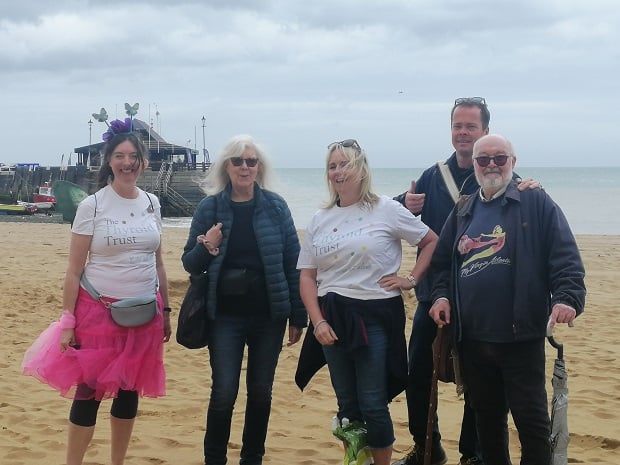
By Lorraine Williams and Sarah Linney
May 25 is World Thyroid Day and the start of International Thyroid Awareness Week which runs until the end of the month.
Thyroid friends in Thanet are organising an informal get together in Broadstairs to support The Thyroid Trust, a national patient charity founded by Broadstairs resident Lorraine Williams.
The thyroid is a gland in your neck which regulates your metabolism and can have wide ranging effects when it becomes diseased. The theme for this year is Thyroid Family, as thyroid conditions often run in families and can affect family life. Thyroid disease affects around 1 in 20 of us and can be highly debilitating, but it is seldom talked about, hence patients can sometimes feel very isolated and misunderstood.
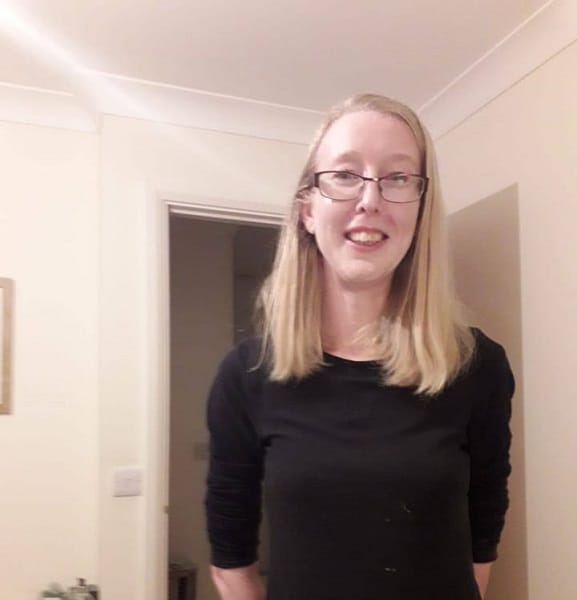
Sarah Linney walked everywhere. All the time, for miles; she loved exploring the countryside. So when she suddenly couldn’t walk up the hill as she came home from work one day, she knew something was very wrong.
She said: “I was completely out of breath and had chest pains. It was all I could do to stagger into the town centre and sit down in a shop.
“I looked awful. My friend thought I was having a panic attack but I knew I wasn’t. I saw a doctor the next day and he told me I was fine, but on the Saturday I ended up going to A&E where they did an ECG. A normal heart rate is around 72 beats per minute. Mine was 180.”
Blood tests revealed the then 32-year-old had a problem with her thyroid. Found in your neck, the thyroid produces hormones which control the speed at which your body’s cells work. If it isn’t producing the right amount of hormones, your body ends up running either too fast or too slow – potentially affecting everything from your heart rate and digestive system to your cognitive function, hair, skin and nails.
Hypothyroidism, or an underactive thyroid, is the most common thyroid disorder and means your body isn’t producing enough thyroid hormones.
This slows everything down so you are likely to feel tired and sluggish, gain weight and feel the cold. You may become depressed and or forgetful.
Conversely, an overactive thyroid, or hyperthyroidism, means your thyroid gland is producing too many hormones, so everything is running too fast. You might experience an increased heart rate or palpitations, weight loss, thirstiness, feeling too hot, anxious or angry.
Because the effects build up gradually, over months or even years, and the symptoms can be quite vague, it can be difficult to realise something is wrong. Some people have few or no symptoms.
Freelance journalist and supermarket night shift worker Sarah said: “I wasn’t losing weight, I wasn’t tired – or, more to the point, isn’t everyone tired? – and as for feeling too hot, I’m always freezing.
“One of my aunts has an underactive thyroid but it was never something I thought about in connection with myself.”
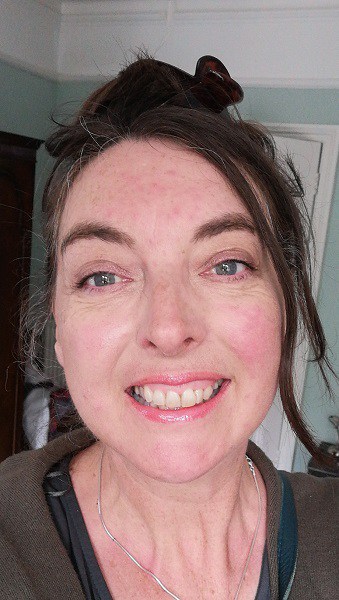
If you’re not feeling well, it’s easy to put it down to the stresses and strains of modern life. For Lorraine Williams, a vague feeling of exhaustion had become a way of life for decades before she was diagnosed with an underactive thyroid – when she went to see her doctor about something else entirely.
She said: “When I graduated from university I wondered how I could possibly have the energy to work full time. I did work full time for 22 years, and I think I ran on adrenalin.
“Then when I was 42, I found I was getting very forgetful and losing the thread of conversations. I would have to ask people to repeat themselves a lot, but I thought I was just getting old, as I was working with a bunch of super-bright twentysomethings.
“The doctor tested my thyroid and found I had subclinical hypothyroidism.”
Both an overactive and underactive thyroid can be diagnosed with a blood test and are usually easily treated.
An underactive thyroid is treated with replacement thyroid hormone, usually thyroxine – a generic synthetic thyroid hormone which is now the routine first line treatment for hypothyroidism – while an overactive thyroid is treated with thyroid-blocking medication or surgery. If you have surgery to remove an overactive thyroid, you’ll then be given replacement thyroid hormone.
Thyroid problems are more common in women than men but can affect anyone, including children – and it runs in families.
Broadstairs Beacon editor Lorraine, 55, said: “My brother suffered from an underactive thyroid, but because he was skinny, it didn’t occur to anyone that that might be the problem. My sister also has an underactive thyroid and she and I think my dad might have had it but never been diagnosed. He died prematurely of a massive heart attack and I’ll always wonder if thyroid disease may have been a contributory factor.”
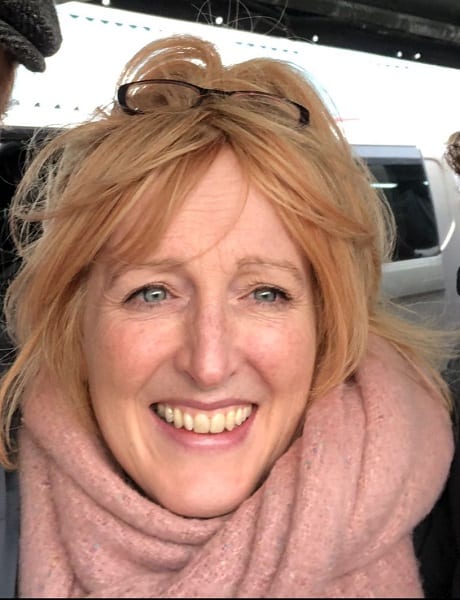
Much rarer, and fortunately usually treatable, is thyroid cancer – which affected Sarah Clark, from Ramsgate, when she was 50.
She said: “I was in a yoga class when I started to rasp. I sat up and felt my throat and discovered a large lump. I went to see my doctor and within a week I was in hospital to have the lump removed, along with half my thyroid gland.
“Your thyroid is integral – it controls your hormones, your energy levels, your body temperature, everything. People just don’t realise the impact it can have on your body when the thyroid is not functioning properly.
“My grandmother also suffered from thyroid issues and was one of the first people to be given thyroxine when it was first introduced in the 1950s. I wanted to take a more natural route and so investigated alternatives, I found Armour Thyroid, which is natural desiccated thyroid hormone, made from pigs’ thyroids, rather than a synthetic product. I was able to gently persuade my endocrinologist to prescribe this for me, it took a while but now I am thriving.
“My advice to people is to research, research, research, help yourself, join forums, be informed when you have an appointment with your doctor or endocrinologist. When you are well informed you might form an opinion about what treatment you want.”
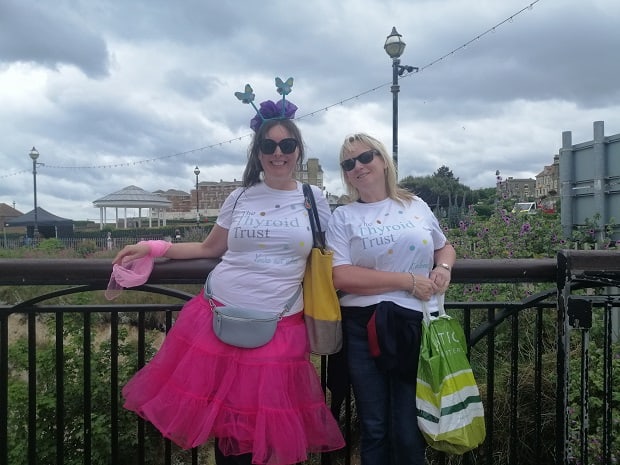
Lorraine’s experience prompted her to set up the Thyroid Trust, an independent charity which advocates for improved access to treatment for thyroid patients, works with NICE and the NHS on treatment guidelines, raises awareness and organises talks and events so people can meet others who are affected.
Thursday, May 25, is World Thyroid Day and the charity will be holding an informal get-together in Broadstairs, meeting at the top of the central steps at Viking Bay at noon. Everyone is more than welcome to join in.
The charity helps patients have access to good quality information – and peer support means they can talk to someone who understands.
If you’re diagnosed with a thyroid condition but still don’t feel well after starting treatment, ask your doctor if there might be scope to adjust your medication, as NICE suggest, or to refer you to a specialist.
Find reliable information at The Thyroid Trust, Thyroid Federation International, the Society for Endocrinology, or the British Thyroid Foundation.
For more information visit
https://www.nice.org.uk/guidance/ng145/informationforpublic
www.nhs.uk/conditions/underactive-thyroid/hypothyroidism
www.nhs.uk/conditions/overactive-thyroid/hyperthyroidism
https://www.nhs.uk/conditions/thyroid-cancer/
To join or support the Thyroid Friends Day at the Seaside https://bit.ly/ThyroidFamily2023

